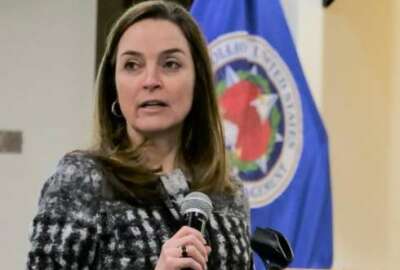
How the pandemic is upending agency views on employee reskilling
The concept of reskilling is no longer limited to low-value value work, as the new virtual environment has changed the game for federal employees looking for...
“Reskilling” was once a novel concept a year or two ago. The word may have invoked fear for some, and opportunity for others.
But the coronavirus pandemic has, in a sense, forced practically all federal employees to “reskill” themselves for a new virtual environment.
“Some of the low value work we were doing has dropped away because we aren’t in the office to do it,” said Robyn Rees, a senior adviser on workforce trends and innovative workforce planning processes at the Interior Department. “Think filing cabinets, printing and stapling presentations for meetings and scanning and signing documents. In some cases that has freed us up to be truly collaborative and more effective. In other cases that has freed us up to do more cross-servicing with fewer people, leaving room for some to consider alternate opportunities where workforce gaps are known.”
The department’s “My DOI Career tool” is serving a new purpose during the pandemic, Rees said earlier this week during a reskilling webinar hosted by the Advanced Technology Academic Research Center (ATARC).
The tool, which the department launched last year, describes possible career paths for Interior employees and suggests the steps they need to take to advance toward those goals.
“We’re looking for opportunities to reskill our employees so they can provide more value added in the work they do and spend less time pushing paper,” said Scott Cameron, Interior’s acting assistant secretary for policy, management and budget.
The department is planning to build employee profiles, where individuals can describe their own skills and competencies. The goal, Cameron said, is to give Interior a place where it can seek out employees with particular skills and then call on them to collaborate and work on future projects.
Mapping out employee career paths also gives the workforce a sense of what their future might look like beyond the confines of their current bureau or organization within the department.
“We have 10 bureaus at Interior, and it’s perfectly fine and perfectly reasonable to explore a career path that would move from one bureau to another over time,” Cameron said. “Historically too many of our employees have felt that they only had one branch on a career path. In order to improve retention and have more well-rounded employees who, frankly, can deliver more value to the organization, we’re trying to encourage people to think more broadly on how they might develop themselves more fully and potentially play a much wider variety of roles during the course of a career at Interior.”
Executives in the Department of Homeland Security have also been “reskilling” in their own ways during the pandemic, said Roland Edwards, the agency’s deputy chief human capital officer.
“We’ve had to be trained as well as reskilled a bit. Now we’re using Microsoft Teams. We’re getting packages electronically. We’re having to sign them electronically. Reskilling has a whole different and evolved connotation in this new pandemic world and, quite frankly, where the future of work is going to take us.”
DHS lines of business had been developing career paths for their employees in IT, finance, human resources and procurement before the pandemic.
“They’re taking care of their own. They’re training folks. They’re developing career path guides, so people actually know how to get from point A to point B in their careers,” Edwards said. “A lot of that was in person learning. We’ve had to move that very quickly to virtual learning. [With] not having to commute … it’s a great opportunity for us to make that shift and make it very quickly so those learning opportunities are available for folks. This is a great time for people to think about their careers and expand their knowledge and skillset.”
Upcoming data science reskilling pilot goes virtual
In other ways, the pandemic has changed the way agencies view more formal reskilling opportunities.
The Office of Management and Budget originally imagined participants in its upcoming data science reskilling pilot would take online training for eight hours a week for four months, followed by an in-person capstone project with their peers in the program.
That plan has shifted due to the pandemic, said Doc McConnell, a senior cybersecurity adviser for the Office of Management and Budget.
“We wanted people to be together, building community and learning from each other,” he said.
The unexpected shift to completely virtual training, however, has provided some benefits.
“We can accept any federal employee into this program now, no matter where they’re based,” McConnell said. “There’s no need to prioritize D.C.-area employees or just those employees who secure travel funding.”
Agencies that are participating in the data science reskilling pilot nominated a few employees to take part in the program. Employees will form into teams based on their agencies, where they’ll put their online training into practice by analyzing their organization’s own data sets.
“It is great for people to be able to passively take in information and learn new things through virtual classrooms, but you’re really not going to get those skills to stick unless the participants have an opportunity to apply them,” McConnell said. “Ideally, you want them to apply the skills that they’re learning to real-world problems, things that they’re really dealing with on a day-to-day basis in their agencies.”
Participants may, McConnell said, analyze data related to the coronavirus pandemic.
“There’s a lot to be learned yet about what data sets they select, how exactly they organize themselves and what problems they choose to solve,” he said. “We don’t think there’s going to be any trouble coming up with those options, but we really look forward to the participants driving those decisions so that it’s something that they are personally interested in.”
About 60 federal employees will participate in the upcoming data science reskilling pilot, which kicks off next month. McConnell said OMB sees the new program as a true pilot — and one the administration hopes it can replicate with future cohorts.
Copyright © 2024 Federal News Network. All rights reserved. This website is not intended for users located within the European Economic Area.
Nicole Ogrysko is a reporter for Federal News Network focusing on the federal workforce and federal pay and benefits.
Follow @nogryskoWFED





